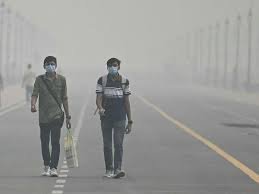
The Delhi government has taken a decisive step to protect children’s health by advancing the winter break for all schools in the city due to the ongoing toxic smog that has enveloped the capital for six consecutive days. The air quality index (AQI) has reached alarming levels, prompting the Directorate of Education to order schools to close from November 9 to 18. This break, traditionally scheduled for December and January, will serve as a safeguard against the adverse weather conditions and escalating air pollution.
The decision to reschedule the vacation period comes as Delhi grapples with the grim reality of dangerous air quality, which poses serious health risks to its residents. The city’s AQI has surged to 421, a sharp increase from 395 just a day earlier, well above the government’s limit of 60 micrograms per cubic meter for PM2.5 particles. This level is 30-40 times higher than the limit recommended by the World Health Organization, highlighting the severity of the crisis.
In an attempt to combat the pollution crisis, the Delhi government has also halted the implementation of its flagship odd-even scheme, which restricts vehicular traffic based on registration numbers. This decision follows concerns raised by the Supreme Court about the scheme’s effectiveness. The court deemed it “optics” and has called for a review before any further action is taken.
Delhi’s Environment Minister, Gopal Rai, confirmed, “The decision to implement the odd-even scheme will be made only after the Supreme Court reviews its effectiveness and issues an order.” The government is now focusing on multiple fronts to address the pollution issue, including the restarting of a smog tower in Connaught Place, following a Supreme Court intervention.
The government’s actions have come as a response to the deteriorating air quality and the demands of the Supreme Court, which is hearing various petitions related to the air quality crisis. The court has called upon the concerned states, including Delhi and neighboring regions, to work together to find solutions to the problem, with particular emphasis on addressing farm fires and stubble burning.
Punjab, a neighboring state where the Aam Aadmi Party is also in power, has been identified as a contributing factor to Delhi’s air quality woes. On Tuesday, Punjab reported over 1,500 stubble-burning incidents, albeit a decrease from the 2,487 incidents reported during the same period last year. Farm fires, vehicular emissions, and a host of other factors are all contributing to the alarming pollution levels in Delhi.
In response to the crisis, the fourth stage of the Graded Response Action Plan has been invoked, leading to the banning of diesel trucks and construction activities among other stringent measures. Despite these efforts, the battle against air pollution in Delhi continues, with the government striving to find effective solutions to protect the health and well-being of its citizens.
Sources By Agencies

